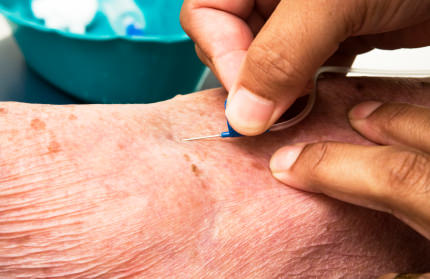
© istockphoto
The possibility of an inexpensive, convenient test for Alzheimer’s disease has been on the horizon for several years, but previous research leads have been hard to duplicate.
In a study published online and in the upcoming issue of the journal Neurology, scientists have taken a step toward developing a blood test for Alzheimer’s, finding a group of markers that hold up in statistical analyses in three independent groups of patients.
“Reliability and failure to replicate initial results have been the biggest challenge in this field,” says lead author William Hu, assistant professor of neurology at Emory University School of Medicine. “We demonstrate here that it is possible to show consistent findings.”
Hu and his collaborators at the University of Pennsylvania and Washington University, St. Louis, measured the levels of 190 proteins in the blood of 600 study participants at those institutions. Study participants included healthy volunteers and those who had been diagnosed with Alzheimer’s disease or mild cognitive impairment (MCI). MCI, often considered a harbinger for Alzheimer’s disease, causes a slight but measurable decline in cognitive abilities.
A subset of the 190 protein levels (17) were significantly different in people with MCI or Alzheimer’s. When those markers were checked against data from 566 people participating in the multicenter Alzheimer’s Disease Neuroimaging Initiative, only four markers remained: apolipoprotein E, B-type natriuretic peptide, C-reactive protein and pancreatic polypeptide.
Changes in levels of these four proteins in blood also correlated with measurements from the same patients of the levels of proteins [beta-amyloid] in cerebrospinal fluid that previously have been connected with Alzheimer’s. The analysis grouped together people with MCI, who are at high risk of developing Alzheimer’s, and full Alzheimer’s.
“We were looking for a sensitive signal,” says Hu. “MCI has been hypothesized to be an early phase of AD, and sensitive markers that capture the physiological changes in both MCI and AD would be most helpful clinically.”
“The specificity of this panel still needs to be determined, since only a small number of patients with non-AD dementias were included,” says Hu. “In addition, the differing proportions of patients with MCI in each group make it more difficult to identify MCI- or AD-specific changes.”
Neurologists currently diagnose Alzheimer’s disease based mainly on clinical symptoms. Additional information can come from PET brain imaging, which tends to be expensive, or analysis of a spinal tap, which can be painful.
“Though a blood test to identify underlying Alzheimer’s disease is not quite ready for prime time given today’s technology, we now have identified ways to make sure that a test will be reliable,” says Hu. “In the meantime, the combination of a clinical exam and cerebrospinal fluid analysis remains the best tool for diagnosis in someone with mild memory or cognitive troubles.”
Hu’s research began while he was a fellow at the University of Pennsylvania. Collaborators included David Holtzman from Washington University at St. Louis, Leslie Shawand John Trojanowski from the University of Pennsylvania, and Holly Soares from Bristol Myers Squibb.
The Alzheimer’s Disease Neuroimaging Initiative is supported by the National Institutes of Health and several pharmaceutical companies. Hu’s research is supported by the Viretta Brady Discovery Fund.
Reference: W.T. Hu et al. Plasma multianalyte profiling in mild cognitive impairment and Alzheimer disease. Neurology 79, 897-905 (2012)


